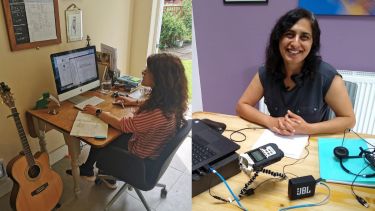The Covid-19 Pandemic has changed the way research is being conducted throughout many institutions. Researchers are extending their projects or adapting their research methods by moving online and conducting research virtually.
Researchers at The University of Sheffield have today launched their website for Everyday Bordering in the UK, a project funded by the Economic and Social Research Council (ESRC) which will explore the relationships between practitioners in social care and migrant families. Specifically, the project seeks to understand if immigration legislation prevents or limits practitioners from providing social care to migrant families, and how this effects the families involved.
Researchers at The University of Sheffield will collaborate with organisations based in Sheffield and Hull who provide social care to people and families who have migrated to the UK. While these areas have varied migration histories, each has experienced an increase in migration over the last decade, which has resulted in more culturally diverse populations. According to Migration Yorkshire, the number of people living in Sheffield and Hull who were born outside of the UK is approximately 13%.
Context
The impetus for the project follows the effects of the Immigration Acts of 2014 and 2016. Intended to create a ‘hostile environment’ as a deterrent to people entering the UK illegally, the legislation prevents such individuals from accessing employment, healthcare, housing, education and banking - among other services. Prior to 2014, it was standard practice for healthcare professionals to check a person’s immigration documents before proceeding with care. The new legislation has extended this responsibility to other people, including some social care practitioners. The phrase ‘everyday bordering’ has been coined to describe this new phenomena where ordinary citizens are responsible for border-making and border control. Concerns include the increased pressure this has placed on professional services, effects on the support families receive from social care, and the potential for all migrant families to be treated with suspicion.
Research Aims
The project aims to identify the extent that 'everyday bordering' has permeated social care professions and if and how the implications of this have impacted migrant families and the support they receive.
Over a one-year period, researchers will review relevant policy and professional guidelines, spend time observing interactions between practitioners and migrant families, conduct focus groups and interviews with practitioners and interview members of migrant families - including children over 13. Collaborations will involve a range of practitioners who provide social care, including social workers, youth and community workers, community educators, early years professionals and volunteers. Due to the current social distancing measures, researchers are collaborating with practitioners virtually and making plans to work with migrant families when social distancing measures are lifted.
Dr Julie Walsh, Project Lead, said: “Working with collaborating organisations throughout the COVID-19 outbreak has been both challenging and surprising. Our research plan had to change and we have engaged with collaborators via a range of online tools, while thinking about how to achieve some of the ethnographic elements of the study. We have (mostly) embraced learning new skills, including how to facilitate focus groups, interviews, and ethnographic conversations, via online video calls and telephone conversations. We’ve particularly enjoyed seeing where people choose to be when they speak with us, especially meeting people’s pets and children, and we look forward to reflecting on what these online encounters have brought to the research relationship.”
‘Everyday Bordering in the UK’ is the first study of its kind to explore how social care workers and the migrant families they work with experience ‘everyday bordering.’ Researchers hope that the findings will help to develop specialist training to support social care staff, while informing future research around the everyday lives of migrant families, everyday bordering, and social care practice.
To find out more about the project and to stay up-to-date with developments, please visit the Everyday Bordering website or follow the team on Twitter.



